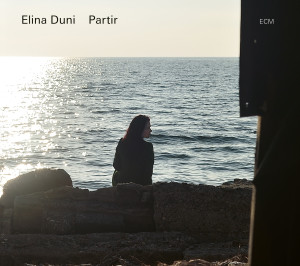 “We’re all leaving. Bound to be torn away, one day or another, from what we love.”
“We’re all leaving. Bound to be torn away, one day or another, from what we love.”
With those words Elina Duni welcomes her audience in to her latest project, a cycle of songs from around the world about love, loss and leaving. Duni is a singular artist, a world-class creator, performer and interpreter of songs, possessed of a beautiful, expressive voice. I came to love her work through her two albums with her quartet, Matanë Malit and Dallëndyshe, on which she interpreted traditional and contemporary Albanian songs in a jazz setting.
The Elina Duni quartet is on hiatus due to the breakup of a longterm relationship, and in the meantime Duni is delving into the rather different world of solo performance. The songs of course reflect whatever’s going on in her personal life, but they also catch what has become the central zeitgeist of this moment, the themes of love and loss and parting, the life of the refugee, the immigrant, the migrant.
For an example of Duni’s performances of these songs, here’s a teaser for the album. It runs some 12 minutes and includes footage of her in performance, accompanied by readings that explain and amplify the songs’ meanings.
Duni has made the strongest break possible from singing all-Albanian songs. The 12 songs on Partir, the studio version of the songs she does in her solo shows, are sung in nine different languages: Albanian, German, French, English, Italian, Portuguese, Armenian, Yiddish and Arabic. She accompanies herself on piano, guitar or a simple frame drum, recorded by ECM’s Manfred Eichner in his inimitable manner at a studio in Southern France. It sounds like it was recorded in a cathedral, Duni’s vocals sounding almost frighteningly intimate.
“Addio, addio amore, io vado via,” she sings in Italian in the opener, “Amara Terra Mia,” an emotional slow waltz accompanied by beautifully strummed and plucked guitar: “Goodbye, goodbye my love, I am leaving. / Bitter land of mine, bitter and beautiful.”
For earthy beauty, go to “Lamma Bada Yatathanna,” (“When he was swaying”) the lament by the 19th-century Egyptian poet and musician Muhammad Abd al Rahim al Masloub. Duni plays a Levantine drum called the *daf* as she sings this gem, with lines like “Who will alleviate my suffering of love and torment / Except for the King of Beauty.”
The traditional Kosovar song “Vishnja,” or “The Cherry Tree” finds Duni playing sparse piano in this lament of a mother for a daughter who is drifting away.
She drops into a deep register and plays guitar on the similarly traditional Armenian “Lusnak Gisher,” in which she’s so love-struck that people think she is a homeless wanderer.
Cold and lovely is the Yiddish song “Oyfn Veg” or “On the Road,” a multi-versed and highly symbolic lament that seems to be about a mother and a dying child – or perhaps one who is merely longing to gain her independence. The child longs to become a bird and fly away, but the mother’s inability to let her go keeps her shackled to the earth.
The traditional Macedonian song “Ani Kaj Lulije” sounds upbeat and rhythmic, as Duni sings the quick verses in Albanian and jazzily scats while playing a rattling hand drum. But the title translates to “Cry, Flower,” about a young woman exiled by her mother for the sin of wanting a bridal dress.
It doesn’t get much bleaker than Jacques Brel’s “Je ne sais pas,” but that song of longing for lost love has nothing on the Swiss German “Schonster Abestarn,” the unaccompanied traditional song of unrequited love that closes the album.
“The songs came from many places,” Duni says. “Some I’ve known for years, some were from other projects – the Armenian song ‘Lusnak Gisher’ came via a theatre production I was involved with. The Arab song ‘Lamma Bada Yatathanna’ was one I knew and liked, and I wanted to sing it, not for political reasons, exactly, but to make a statement. The Yiddish song ‘Ofyn Weg’ was another one I knew and loved. And so on. And then the question was: how can I use the songs to tell a larger story? The idea to sing in nine languages was a decisive one – also, again, to stress the universality of the theme, about leaving, about facing the unknown, and the will to continue.”
We humans are wanderers. Elina Duni with Partir continues the long tradition of assuaging, through song, the pain that comes with leaving, exile, and parting. The emotion comes through regardless of the language.
(ECM, 2018)
See Elina Duni’s website for more information and tour dates.
